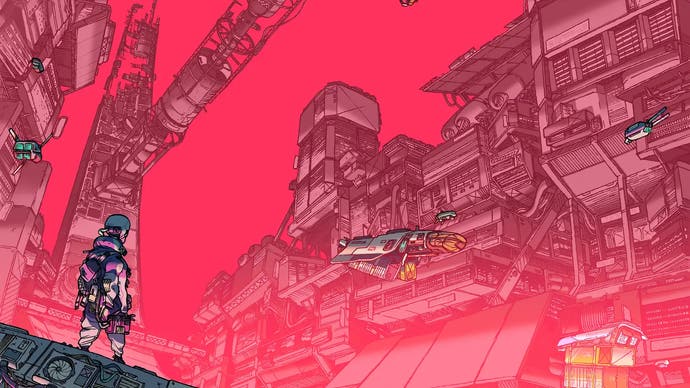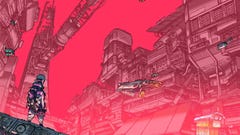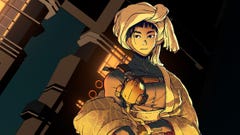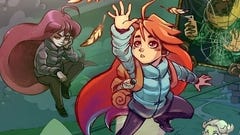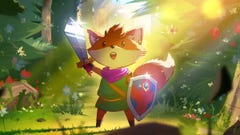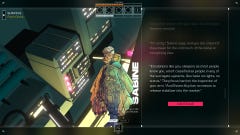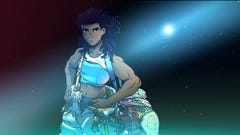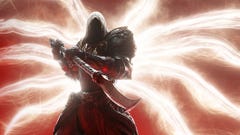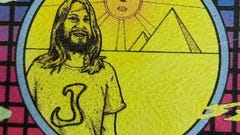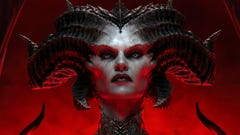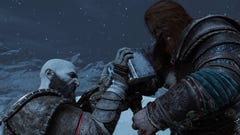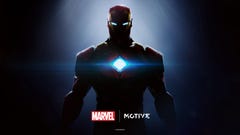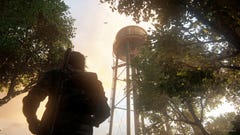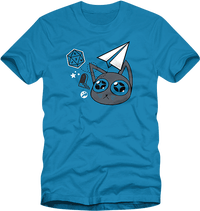How the BAFTA nominated Citizen Sleeper is a game "about now"
Gareth Damian Martin on the game's refugee-themed DLC.
Science fiction often isn't really about the future. It's a reflection of our present, how today's anxieties and issues might be represented tomorrow.
Citizen Sleeper is a game about an android in a space station, overthrowing a corrupt corporation, and finding a home. But it's also a game about identity, about capitalism, and about trans experience. And now, with the third and final arc of its DLC released today, it's a game that explores refugees too.
Indeed, solo developer Gareth Damian Martin told me "the game is intended to be about now, as opposed to about the future". That seems particularly pertinent when the game has been nominated for four BAFTAs, including British Game and Game for Impact. It's something the developer admitted to feeling uncomfortable about.
"It's a very weird position to be in because it feels like a bit of a veiled compliment," they said. "As in, it kind of implies strange things about what games are. What does it mean for a game by a non-binary person that is about trans experience, that is about the gig economy, that is about citizenship and refugees? And to be the best British game in a year? Do I even want to be part of a project that is about sticking all those things under a flag and celebrating them because they're under that flag? It makes me feel very uncomfortable. That stuff's complicated."
Ahead of Thursday's BAFTA Game Awards I spoke with Damian Martin about the intimate human stories in Citizen Sleeper, what prompted the exploration of refugees, and whether more stories of warmth and compassion in the coldness of space are on the way.
What inspired the refugee story in the three-part DLC?
It was originally a concept that I had in the mix for the base game: there's a reason there's that big gap in The Eye and I wanted to have a refugee flotilla there very early on. That fell to the wayside during making the game. It just didn't quite fit in, but when I came to thinking about adding more to the game, I loved the idea of ships arriving at The Eye and that instigating something. Also I really wanted to begin to introduce people to the world outside of The Eye, or at least to start people thinking 'What is this solar system? How does the universe work?' But those are very mechanical game design reasons.
Where it ended up feeling like a really good choice for an end game scenario is that I wanted the player to be established by the time they encountered other people who had need of a place to settle. There's a reason the word 'citizen' is in the title, because as much as it's a game about subjective experience, about textures and tastes and feelings and emotions, it's also about the very structural and material conditions of being classified by structures. A citizen is a very specific kind of classification that is used for and against individuals. And it felt necessary to explore the idea of being a refugee in relation to being a citizen. Because I think there are a lot of tension points there. There are lots of good things about the idea of citizenship and the idea of working together collectively and being part of a wider body, or maybe agreeing that we're all similar somehow. But also it is a massive tool of consolidation of power that requires there to be an external other person to create the idea of the citizen and obviously historically has been used incredibly powerfully to turn people against each other.
It's a fun and interesting way to problematise the idea of home or ownership that the player might start to get over this community, when this community is not something that can be owned by the player.
The DLC seems particularly political and relevant to today, was that intentional?
Obviously it's impossible not to pay attention to what's happening in this country right now. But I didn't think 'Oh refugee flotilla because timely hot button subject'. For me it was very thematically aligned and it's something that has been a massive part of my life anyway. My partner is Romanian and we have dealt with so much immigration shit, my partner's had so many different immigration statuses. So spending a lot of time thinking about this stuff and being trapped in these structures and having to deal with them, it's something that I wanted to write about and think about in my work.
The one thing I try to be careful with in the DLC is I'm not a refugee and I've spoken to some people who have had an experience of being refugees, but I also didn't want to make it like 'Ok, now I'm going to tell a refugee story'. I think there are other games that do that. So I did want to also keep it inflected within the particular conditions of this science fiction world and keep just a little bit of distance. People have said 'the Sleeper is a metaphor for trans experience or for being diabetic and needing insulin in the US'. It aligns with those things but at no point did I ever think I'm making a metaphor here. I was much more interested in modelling a wider set of themes that would connect to that.
The game has a diverse mix of characters. Why did you decide to champion outsiders? Does that reflect your own personal experience in any way?
The game is 100 percent derived from my experience, even in ways that I think I only understood later on when watching other people play the game after its launch.
A lot of the things around the Sleeper and the position of the Sleeper, my focus in the beginning was to think about the gig economy, which is something that I spent a lot of time working in. I've also had chronic depression for most of my life, so the combination of depression and employment agency work, it does very much feel like you just spin two wheels and you see what things get pointed out.
That was twinned with something that I was observing more generally in the way in which I think people are exposed to risk in our generation, which is that it's a very big part of our lives and we feel constantly under pressure from systems that are so big that usually we wouldn't know they existed. Now we have so much information that the billionaires are visible and the systems are visible and we know how corporations work and we see how they work, but none of that stops them from continuing to behave in the way that they behave. Just observing them is not enough. See this giant boulder? It's going to slowly roll over us and pressure us. But we can't do anything to stop it. And that feels like a very particularly contemporary feeling. And whether or not that is a terrible, miserable tragedy? Is every nice moment in your life inflected with the reality that you could one day just be crushed by a machine that doesn't care you exist, or is the joy of life that, despite the fact that system exists, it really doesn't matter because our joy and our sense of self comes from us and the people around us, not from that huge thing which actually we're not related to in any way? I wanted to have a character that was smack bang in the middle of that kind of tension, and that was all about discussing these casually destructive and parasitic systems that exist around us.
The idea of a person who has done a terrible thing to themselves in the past or can't really process what their previous self's motivations were for getting them to this point, that's a very personal thing for me as well. Also the process of not recognizing your own body or feeling depersonalised, looking in the mirror and being like, 'is this really me?' I think those are things that I naturally move towards because those were things that I've experienced and so I think the Sleeper is a hybrid of my own experiences.
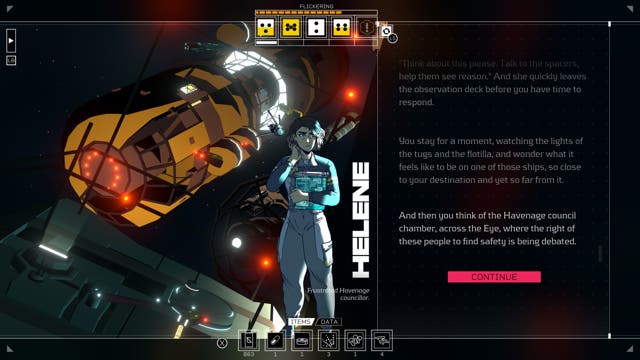
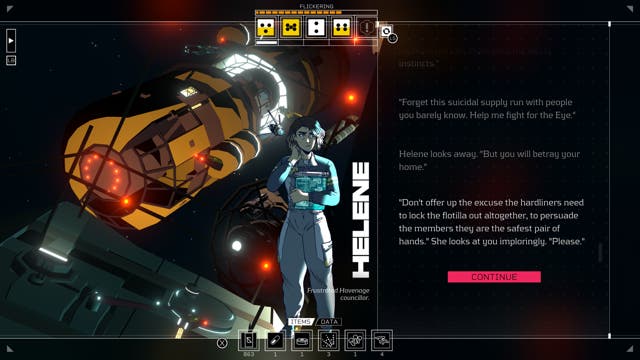
There's a real juxtaposition between warm human stories and the coldness of space. Was that intentional to bring humanity to science fiction?
Yeah, 100 percent. I think I am somebody who, when I'm watching a science fiction film or experiencing anything of science fiction, I'm very focused on what's happening in the background because I'm usually not that interested in the weird, usually pseudo-police main character who's doing something bad like bounty hunting or being an unrestricted military officer. I'm more interested in 'oh look, we've arrived in a city and look there's things happening, there are people and shops and characters who are going to meet people'. I love that. I think that's the thing that really excites me in sci-fi.
One of the things I tried to do is science fiction about people, where it's all about human scale, relatable stories within a science fiction urban context. But the game is intended to be about now, as opposed to about the future. I think that kind of coldness combined with warmth of other humans or just the passive warmth that you get from strangers and those lives happening around you is something that happens in cities a lot. And that's something that's part of my experience with urban space.
I think being alone around people and also being separated from society in some way, or being on the outside a little bit - but also the vantage point of that, that you can kind of observe what's happening in this space - I wanted players to feel like that, to feel separated.
The music also reflects that juxtaposition. What was your brief to composer Amos Roddy, and what were you trying to evoke with the music?
The thing I love about Amos's work is I guess I'm a reasonably cold person, although I love people, but both Amos and Guillaume [Singelin, artist] make work that is much more warm than my intent, and so I like having them in the mix because I like the the kind of additional emotional depth that they bring to things.
I think what marks out Amos's music is it has an emotional quality to it, like it seems to engage people emotionally in a way that is quite distinct. And so it's not just exciting or propulsive, but it's often thoughtful and reflective. So I think that quality is something we really pushed.
The images that I gave Amos in the beginning, I talked a lot about atmospheres, like 'what does it feel like when you're in a car being driven at night by somebody else and you look out the window and you see the lights of the city? What's that feeling of there are lots of lives going on and they're not my life, but they're all running and I'm part of this thing, but I'm also not?'.
I think a lot of things we talked about were also cycles. So a big part of the music is repetition, which is something Amos doesn't typically use a lot in his work. But a lot of the music has this feeling of this small cycle that's running and then that small cycle builds and then we have a phase shift and then another cycle has to start running, and so the music's quite meditative.
Amos wrote loads of music and we just stuck it in the game, we just played on a jukebox at random. And then we tried to embed the mood system in the game. There's four moods in the game: ominous, pessimistic, reflective, and optimistic, which is just how we grouped the music that already existed. Then there's a number that goes from one to four and every scene that plays in the game sets the number to something depending on the mood of the scene, but then also things like the level of your condition or when you fail a roll, those things can affect the mood number and then when a piece of music plays, which is usually at the end of a scene or the beginning of a cycle, the game just estimates what mood you're in by that number. There was a kind of vagueness to that that was really nice and the kind of looseness to it that it felt like the music was responsive, but it was unclear how it was responsive. And so we ended up just leaving it like that with that very nebulous sense.
I love that a game all about dice rolls and numbers still has numbers with its music in some way!
That's just video games. It's all numbers at the end of the day!
You said that Citizen Sleeper is a game about now, what did you mean by that?
That's how I think of science fiction. I love to read science fiction from the 80s. And when you read it, it's got nothing to do with the future. It's got everything to do with what was happening in the 80s. [With Citizen Sleeper] the first thing I wanted to talk about was this experience that I'd had myself, but also that I felt was more widely seen in my generation from what I've observed, which is the experience of feeling precarious or precarity. And I think precarity was the starting theme for me. Why is it that we think of ourselves as being very precarious? And how is it about the real risks we're exposed to? And trying to model some of that with the dice system.
So I was always trying to lean back into this idea of what does precarity mean? What does it mean to be exposed to risk and to feel that? And what different kinds of precarity exist? We've seen it in this country. When something happens like Brexit, you feel like anything could be rolled back. Anything could be changed. Any kind of fundamental right or belief could switch.
Episode: PURGE is out!
— Gareth Damian Martin | Jump Over the Age (@JumpOvertheAge) March 30, 2023
The final chapter for Citizen Sleeper is also the beginning of the future for the Helion system.
Thank you all for coming on this incredible journey with me 💫
Steam: https://t.co/qqgCZ7gx2P
Xbox: https://t.co/Z1Qcm9wRUC…
Switch: https://t.co/qqgCZ7gx2P
What has the DLC allowed you to achieve you couldn't in the main game?
I think I was happy with the game as a complete package from some perspectives, but I think that the game was intended to be a test ground for an idea. I didn't want to spend five years making it and then find out later whether or not people liked it. I wanted to also experiment with the idea of doing something episodic. So actually for each DLC I made the DLC and then I released it, and then I made the next chapter and then I released it. I like to leave myself a lot of gaps and a lot of loose hanging threads all over the place when I write stories so that I can come and pick them up again. So it's less the case of things being incomplete and more the case that I built Citizen Sleeper to be something that could be built on.
Does that mean there will be more from the world of Citizen Sleeper? Are there more stories to tell?
I'm definitely not done. I'm not shifting my focus for the time being. Part of the plan was to make something and see if people like it and the response has been so much louder than I expected. So I definitely have to continue down this path and see where it goes until people start telling me they really don't like it. So I think that's what I'll do. But I like to be agile in some sense, I like to try out different ideas and do experiments. There's some stuff coming up for the anniversary that will hopefully be quite fun and allow people to have a different interaction with the world. There definitely will be more things for people who are interested in Citizen Sleeper. They should pay attention to me for the next three months!
